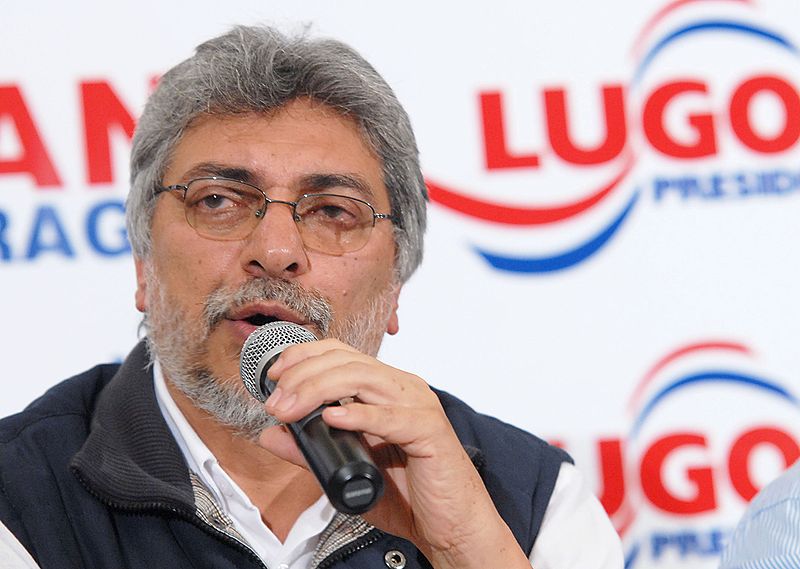Paraguayan Coup: Saying "Hasta Lugo"
 On June 21, the Paraguayan Chamber of Deputies, by a vote of 76 to one, impeached President Fernando Lugo, in what was the climax to a long period of tension between Mr. Lugo and Paraguay’s legislative body. The events of June 15, when police clashed with farmers leading to the death of 11 peasants and six policemen saw Lugo’s chief legislative support, the Liberal Party, turn against his government and join the impeachment procedure. Many in Paraguay and around the region fear that this impeachment is an attempt by Paraguay’s parliament to stall the slow process towards democracy and social equality.
On June 21, the Paraguayan Chamber of Deputies, by a vote of 76 to one, impeached President Fernando Lugo, in what was the climax to a long period of tension between Mr. Lugo and Paraguay’s legislative body. The events of June 15, when police clashed with farmers leading to the death of 11 peasants and six policemen saw Lugo’s chief legislative support, the Liberal Party, turn against his government and join the impeachment procedure. Many in Paraguay and around the region fear that this impeachment is an attempt by Paraguay’s parliament to stall the slow process towards democracy and social equality.
Fernando Lugo is, by all means, an atypical politician. A former Roman Catholic bishop, he was elected in 2008 with the nickname of “bishop of the poor” and became Paraguay’s first elected leftist president. His election became a direct threat to the dominance of the Colorado Party, which lost power for the first time in 61 years. Mr. Lugo has argued that his impeachment was nothing more than a “parliamentary coup”, an attempt by a conservative parliament to retain its hold on power. Indeed, Lugo’s policies, though moderate, threatened the established inequalities in a country where 2 percent of the population control more than 75 percent of fertile land and one third of the rural population is landless.
Mr. Lugo’s impeachment can also be explained by his failing as a politician. He allowed the Liberal Party to back his bid for power in exchange for a vice-presidential position and Lugo opened the door for more trouble. Indeed, in Paraguay’s highly bipolar political system, the Colorados and Liberals compete for power through a very clientelistic political system, by distributing public resources to their respective support base. Though the Colorados had been winning this political game for the past 60 years, the Liberals saw in Fernando Lugo and his leftist coalition, the perfect highway to power. In other words, though they supported the “president of the poor”, the Liberals were already planning their very own bid for power.
The two parties’ decision to collaborate in the impeachment plot is a win-win situation. First of all, it gets them rid of a possibly dangerous figure, whose steady reforms might have eroded their privileges. Better get rid of Lugo now, and portray him as a dangerous radical unable to preserve social peace than to see him use public resources as a means to develop a permanent power base (and an electorate) for his leftist coalition. Secondly, the Liberals accepted impeaching Lugo so that they can take advantage of the resources of the state for the next nine months, a period during which they will undoubtedly attempt to consolidate their power and voter base in view of the next election. The Colorados, by getting rid of Lugo, are almost certain of winning back a majority at the next election. Thus, the president of Paraguay, elected democratically, was ejected from a game in which the political parties of the country believed he did not have a say.
As a result, no member-country of the Organization of American States has recognized the new government and many countries have withdrawn their ambassadors from Paraguay. The Mercosur trading bloc, Latin America’s free trade area, has even expressed its support to Lugo by suspending Paraguay from trade negotiations, and the region’s main leftwing leaders have expressed their outrage at the situation. However, the diplomatic responses from Paraguay’s neighbors were often met with cynicism: Argentina and Brazil were especially keen on replacing Paraguay with Venezuela inside Mercosur. On the contrary, the U.S.’s silence on the affair has drawn criticism and some have argued that the coup, through the rise to power of a more conservative Paraguayan government, is an opportunity for America to regain influence in the region.
Though Lugo’s policies were far from perfect and his social protection system and land reform came short of satisfying his campaign promises, they were the first real effort to relieve Paraguay from the burden of poverty. Lugo failed to work hand in hand with a powerful Congress and his burdensome Liberal “allies” and managed to unite most of Paraguay’s political system against him. Though the proceedings for his impeachment were perfectly legal, they leave Paraguay’s democracy weakened, its leaders diplomatically isolated, and its poor unattended.
